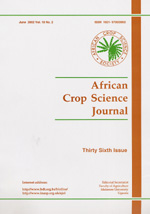
|
African Crop Science Journal
African Crop Science Society
ISSN: 1021-9730
EISSN: 1021-9730
Vol. 20, No. s2, 2012, pp. 465-472
|
 Bioline Code: cs12059
Bioline Code: cs12059
Full paper language: English
Document type: Research Article
Document available free of charge
|
|
|
African Crop Science Journal, Vol. 20, No. s2, 2012, pp. 465-472
| en |
ACCESSING THE GLOCALITY OF CLIMATE CHANGE: A COGNITIVE FALLACY
NTAMACK, SERGE
Abstract
This essay addresses some methodological biases present in the mode of knowing the changing weather through
scientific research. These biases are coined with the concept of glocality. The paper argues that as a device of the
cognitive globalisation around environmental issues, glocality operates in science as a cognitive form of ubiquity
deriving from an attempt to compress the spatiotemporal dimension of the changing weather within the time and
space of the mind. In the case of climate change, it refers to three focal points summarised as problems of climate
change’s phenomena, problem of the ontologies of climate change’s phenomena and problem of the logics of
climate change’s phenomena. The intersections between these three problems show how blurry are the frontiers
between scientific knowledge and political power.
Keywords
Climate change. cognition, globalisation, international relations, knowledge
|
| |
| fr |
NTAMACK, SERGE
Résumé
Cet essai traite de certains cas de méthodologie biaisée dans le mode de savoir sur le changement climatique à travers la recherche scientifique. Ces erreurs sont associées au concept de la glocalité. Cet article montre que
comme instrument de la globalisation cognitive des problèmes environnementaux, la glocalité opère en science
comme une forme cognitive de l’ubiquité dérivant d’une tentative de comprimer la dimension spatiotemporelle du
changement climatique dans le temps et l’espace. Dans le cas du changement climatique, la glocalité se réfère à
trois points focaux exprimant les problèmes liés au phénomène du changement climatique, les problèmes du
phénomène ontologique du changement climatique et les systèmes logiques des phénomènes du changement
climatique. Les intersections entre ces trois problèmes montrent comment les frontières entre la connaissance
scientifique et le pouvoir politique ne sont pas claires.
Mots Clés
Changement climatique, cognition, globalisation, relations internationales, connaisance
|
| |
© Copyright 2012 - African Crop Science Society
|
|
